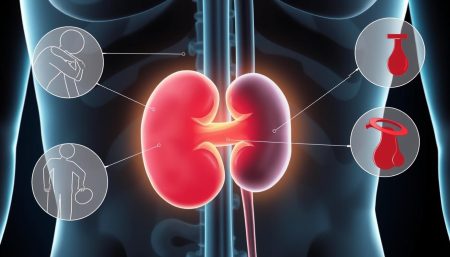The way we treat metastatic prostate cancer has changed a lot lately. Thanks to new medical discoveries, patients are living longer and better. This good news gives hope to those dealing with this tough disease.
In this article, we’ll look at the latest in treating metastatic prostate cancer. We’ll talk about new treatments and how they’re changing lives. By mixing science with personal stories, we want to show how far we’ve come in helping patients live better.
Understanding Metastatic Prostate Cancer and Modern Survival Rates
Metastatic prostate cancer is a complex condition that has seen significant changes in treatment and outcomes. We will explore the stages, survival rates, and factors that influence them. This will help us understand if advanced prostate cancer treatments are helping patients live longer.
Defining Metastatic Prostate Cancer Stages
Metastatic prostate cancer occurs when cancer cells spread beyond the prostate to other parts of the body. It’s classified into stages based on how far it has spread:
- Stage M1a: Cancer has spread to nearby lymph nodes
- Stage M1b: Cancer has spread to the bones
- Stage M1c: Cancer has spread to other organs or distant sites
Current Survival Statistics and Trends
Recent data shows improvements in survival rates for metastatic prostate cancer patients. The five-year relative survival rate has gone up from about 30% in the 1990s to nearly 40% today. This increase is mainly due to better treatment options.

Factors Influencing Survival Rates
Several factors impact survival rates for metastatic prostate cancer:
- Age and overall health at diagnosis
- Extent of metastasis
- Response to treatment
- Access to advanced prostate cancer treatments
Are metastatic prostate cancer patients living longer now? Yes, thanks to new therapies and personalized treatments. However, outcomes can vary a lot based on these factors.
Are Metastatic Prostate Cancer Patients Living Longer Now: Latest Research Findings

Recent studies show good news for prostate cancer patients. They found that people with metastatic prostate cancer are living longer. This is thanks to better treatments and early detection.
A detailed look at clinical data shows a big jump in survival rates. The five-year survival rate for metastatic prostate cancer went from 30% to 36% in the last decade. This is a big deal, especially for advanced-stage prostate cancer.
One case study shows a patient with metastatic prostate cancer lived over 9 years after diagnosis. This is much longer than expected. It shows that with the right treatment, people can live longer with advanced prostate cancer.
“The landscape of metastatic prostate cancer treatment is evolving rapidly, offering new hope for patients and their families.”
What’s helping patients live longer includes:
- New hormone therapy options
- Advanced radiation techniques
- Immunotherapy breakthroughs
- Custom treatment plans
Even with these positive changes, it’s key to remember that everyone’s experience is different. Researchers keep working to improve survival rates and quality of life for those with metastatic disease.
| Year | 5-Year Survival Rate | Median Survival (months) |
|---|---|---|
| 2010 | 30% | 30 |
| 2015 | 33% | 33 |
| 2020 | 36% | 36 |
Revolutionary Treatment Advances Improving Patient Outcomes
New treatments have changed how we fight metastatic prostate cancer. They offer hope for longer lives and better health. These advances are making a big difference.
Breakthrough Hormone Therapy Options
Hormone therapy for prostate cancer has made big strides. New drugs target androgen receptors better, slowing cancer. These options are available even when other treatments don’t work.
Next-Generation Chemotherapy Protocols
Chemotherapy for prostate cancer is getting better. New protocols use targeted drugs, reducing side effects. These treatments work well with other therapies, offering a full approach to fighting cancer.
Innovative Immunotherapy Approaches
Immunotherapy for prostate cancer uses the body’s immune system to fight cancer. New methods, like CAR T-cell therapy, are showing promise. They offer hope for those who don’t respond to usual treatments.
Targeted Therapy Developments
Targeted therapies for prostate cancer focus on cancer’s unique traits. They aim to harm cancer cells less, helping patients more. Research shows the value of treatments tailored to each patient’s needs.
| Treatment Type | Key Advantages | Potential Challenges |
|---|---|---|
| Hormone Therapy | Effective in slowing cancer growth | Possible side effects like fatigue |
| Chemotherapy | Can shrink tumors quickly | May cause temporary hair loss |
| Immunotherapy | Boosts body’s natural defenses | Not effective for all patients |
| Targeted Therapy | Precise attack on cancer cells | Requires genetic testing |
Personalized Medicine and Genetic Testing in Prostate Cancer Care
Personalized medicine is changing how we treat prostate cancer. Genetic testing lets doctors create treatments that fit each patient’s unique genetic profile. This makes treatments more effective and reduces side effects.
Role of Genetic Profiling
Genetic profiling finds specific mutations in a tumor. This info helps doctors choose the right treatment. For instance, some genetic markers show how well a patient will respond to certain advanced prostate cancer treatments.
Tailored Treatment Strategies
With genetic data, doctors can make personalized treatment plans. These plans match therapies to a patient’s cancer profile. This approach boosts the chances of successful treatment.
| Genetic Marker | Recommended Treatment |
|---|---|
| BRCA1/2 Mutations | PARP Inhibitors |
| AR-V7 Positive | Taxane Chemotherapy |
| MSI-High | Immunotherapy |
Precision Medicine Breakthroughs
Precision medicine is growing fast. New targeted therapies are coming from clinical trials for prostate cancer. These treatments target cancer-causing mutations, protecting healthy cells.
“Precision medicine allows us to treat the cancer, not just the patient. It’s revolutionizing prostate cancer care,” says Dr. Emily Chen, oncologist.
As research continues, personalized medicine will likely lead to better survival rates and quality of life for prostate cancer patients.
Quality of Life Improvements for Metastatic Prostate Cancer Patients
When we ask if metastatic prostate cancer patients are living longer, we must look at their quality of life too. Today’s treatments aim to not just extend life but also improve how patients feel. This is especially important for those with advanced disease.
Pain management and supportive care have gotten much better. Now, patients can manage their symptoms better. This lets them stay active and independent, boosting their mood and mental health.
Support systems for those with metastatic prostate cancer have grown stronger. There are support groups online and in-person. These groups help patients and their families share experiences and find hope.
Care for metastatic prostate cancer now focuses on the whole person. Doctors use traditional treatments and add things like nutrition advice and exercise. This approach helps patients live better, not just longer, with advanced prostate cancer.
FAQ
Q: Are metastatic prostate cancer patients living longer now?
A: Yes, patients with metastatic prostate cancer are living longer thanks to new treatments. Personalized medicine and better care have made a big difference. Studies show that some patients are living several years longer than before.
Q: What are the current survival rates for metastatic prostate cancer?
A: Survival rates for metastatic prostate cancer have improved. The five-year survival rate is now about 30%. But, many patients live longer than these numbers suggest, thanks to new treatments.
Q: What factors influence survival rates in metastatic prostate cancer?
A: Several things affect survival rates. These include how far the cancer has spread, the patient’s health and age, and the cancer’s genetic profile. Early treatment and access to advanced therapies also play a role.
Q: What are the latest treatment advances for metastatic prostate cancer?
A: New treatments include hormone therapies, immunotherapies, and targeted therapies. These are often used together. They have shown to improve survival and quality of life for patients.
Q: How has hormone therapy for prostate cancer improved?
A: Modern hormone therapies like abiraterone and enzalutamide work better. They target androgen receptors or block testosterone production. This slows cancer growth and improves survival rates.
Q: What role does immunotherapy play in treating metastatic prostate cancer?
A: Immunotherapy, including checkpoint inhibitors and CAR T-cell therapy, is promising. It uses the body’s immune system to fight cancer. This can lead to long-term remission for some patients, especially those with certain genetic markers.
Q: How does genetic testing impact prostate cancer treatment?
A: Genetic testing has changed treatment by enabling personalized medicine. It helps identify genetic mutations. This allows doctors to choose targeted therapies that are most likely to work for each patient.
Q: What clinical trials are currently available for metastatic prostate cancer?
A: Many clinical trials are ongoing. They explore new treatments like PARP inhibitors and radiopharmaceuticals. These trials aim to improve outcomes for patients with metastatic prostate cancer.
Q: How has the quality of life improved for metastatic prostate cancer patients?
A: Quality of life has improved thanks to better side effect management and less invasive treatments. Patients experience less pain, better mobility, and overall well-being. This allows them to live better while undergoing treatment.
Q: What is the role of targeted therapies in treating metastatic prostate cancer?
A: Targeted therapies, like PARP inhibitors for patients with BRCA mutations, are very effective. They target specific genetic alterations or molecular pathways in cancer cells. This can lead to more effective treatment with fewer side effects.


















